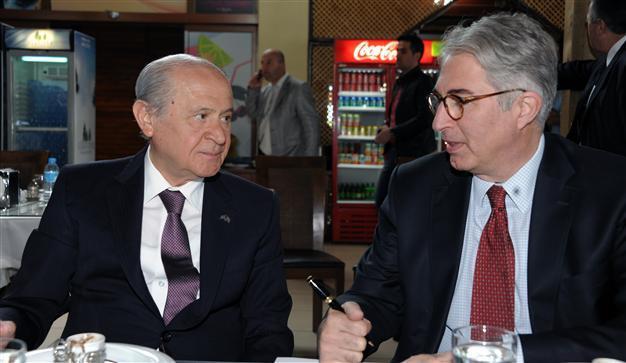MHP ‘will not back’ Erdoğan’s presidential system
Murat Yetkin - ZONGULDAK

As Turkish national anthem is sung by 4,000 people before Nationalist Movement Party (MHP) leader Devlet Bahçeli takes the podium on May 14, young men and women raise their right arms to make the “grey wolf” hand gesture - a mythological symbol of Turkish nationalism. Meanwhile, mine workers with yellow protective helmets chant slogans for more jobs and job security in this Western Black Sea coastal city, which is a major center of coal mines and also of mine accidents in Turkey.
The MHP wants to win at least one of the five deputies that Zonguldak will send to the 550-member Turkish parliament in the elections on June 7. Currently it has none. The province has three deputies from the ruling Justice and Development Party (AK Parti) and two from the social democratic main opposition Republican People’s Party (CHP), which actually is trying the reverse the 3-2 balance. MHP officials hope they can attract enough votes from the AK Parti to make the situation at least 2-2-1.
The next stop yesterday for the MHP was Bartın, where it won the last municipal elections in March 2014.
The last stop was the industrial town of Karabük, where the party hopes to send at least one deputy to parliament.
Two main questions face the MHP regarding its stance after the elections. If the Kurdish problem-focused Peoples’ Democratic Party (HDP) manages to exceed the 10 percent national threshold, it would be almost impossible for President Tayyip Erdoğan to achieve his goal of shifting Turkey’s parliamentary system into a presidential one with reduced checks and balances through a constitutional change by AK Parti votes.
Under those circumstances, will the MHP support the AK Parti for a constitutional change to introduce the presidential system?
“No,” replied Bahçeli during a stop at a gas station restaurant along the way. “Erdoğan wants regime change. The MHP is not going to back a presidential system, it is impossible for us to support Erdoğan. We want a new constitution, but through parliamentary mechanisms, in order to achieve a better democratic parliamentary system.”
The second question is about scenarios leaked from the AK Parti ranks. President Erdoğan and Prime Minister Ahmet Davutoğlu imply that the alternative to the AK Parti would be a coalition government with the MHP, hoping to revive fears of instability after years of fragile coalitions. Is the MHP getting ready for a coalition after the election, if the AK Parti is unable to form a single-party government?
“Turkey has a tradition of coalitions,” Bahçeli said. “But unfortunately coalitions failed to deliver much to people, neither were they long-lasting. We do not favor a coalition. We aim to establish our own government.”
The polls - which Bahçeli says he has no confidence in - currently show the MHP in third place within the 16-18 percent bracket. He believes that if something “extraordinary does not take place in the last 10 days,” the AK Parti government could fall. He doesn’t give any clues what that might be, but says the AK Parti “would do anything to stay in power.”
Despite being a highly ideological party, the MHP has also built its election campaign on criticism and pledges in the economic field. Bahçeli has tried to hit Erdoğan and Davutoğlu over the corruption cases and luxurious spending, and he has made promises to working and unemployed people.
He also claims there is a division of labor between Erdoğan and Davutoğlu during the campaign, describing them as the “co-chairmen” of AK Parti: Erdoğan focuses on the shift to a presidential system and Davutoğlu focuses on the election.
“Erdoğan wants to claim the bounty for himself if they win the election,” Bahçeli claims. “And if they lose, he wants Davutoğlu to pay the bill.”
 As Turkish national anthem is sung by 4,000 people before Nationalist Movement Party (MHP) leader Devlet Bahçeli takes the podium on May 14, young men and women raise their right arms to make the “grey wolf” hand gesture - a mythological symbol of Turkish nationalism. Meanwhile, mine workers with yellow protective helmets chant slogans for more jobs and job security in this Western Black Sea coastal city, which is a major center of coal mines and also of mine accidents in Turkey.
As Turkish national anthem is sung by 4,000 people before Nationalist Movement Party (MHP) leader Devlet Bahçeli takes the podium on May 14, young men and women raise their right arms to make the “grey wolf” hand gesture - a mythological symbol of Turkish nationalism. Meanwhile, mine workers with yellow protective helmets chant slogans for more jobs and job security in this Western Black Sea coastal city, which is a major center of coal mines and also of mine accidents in Turkey.